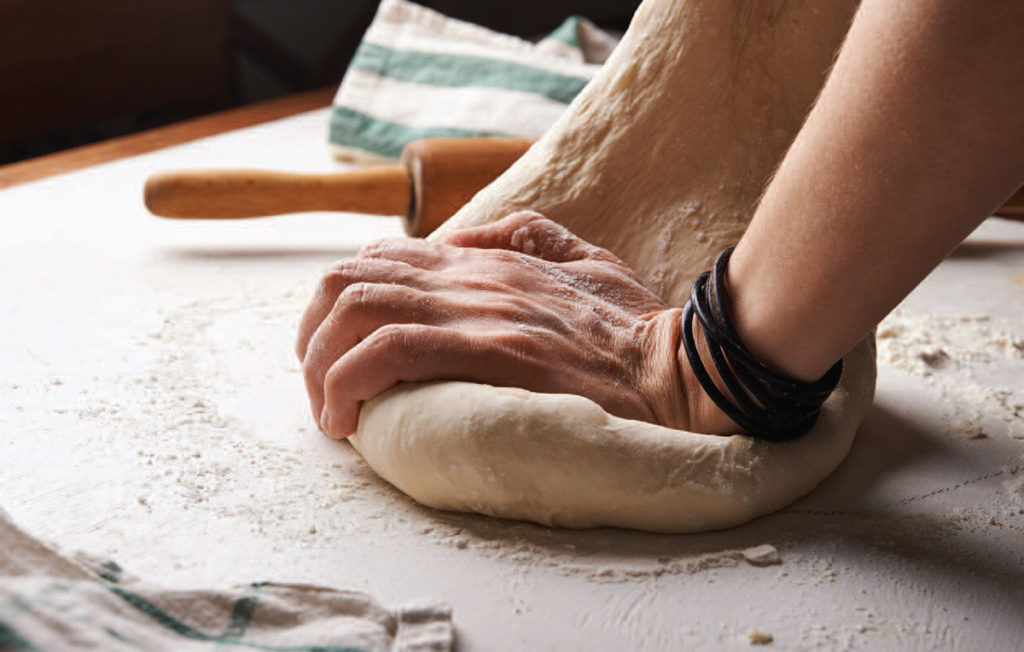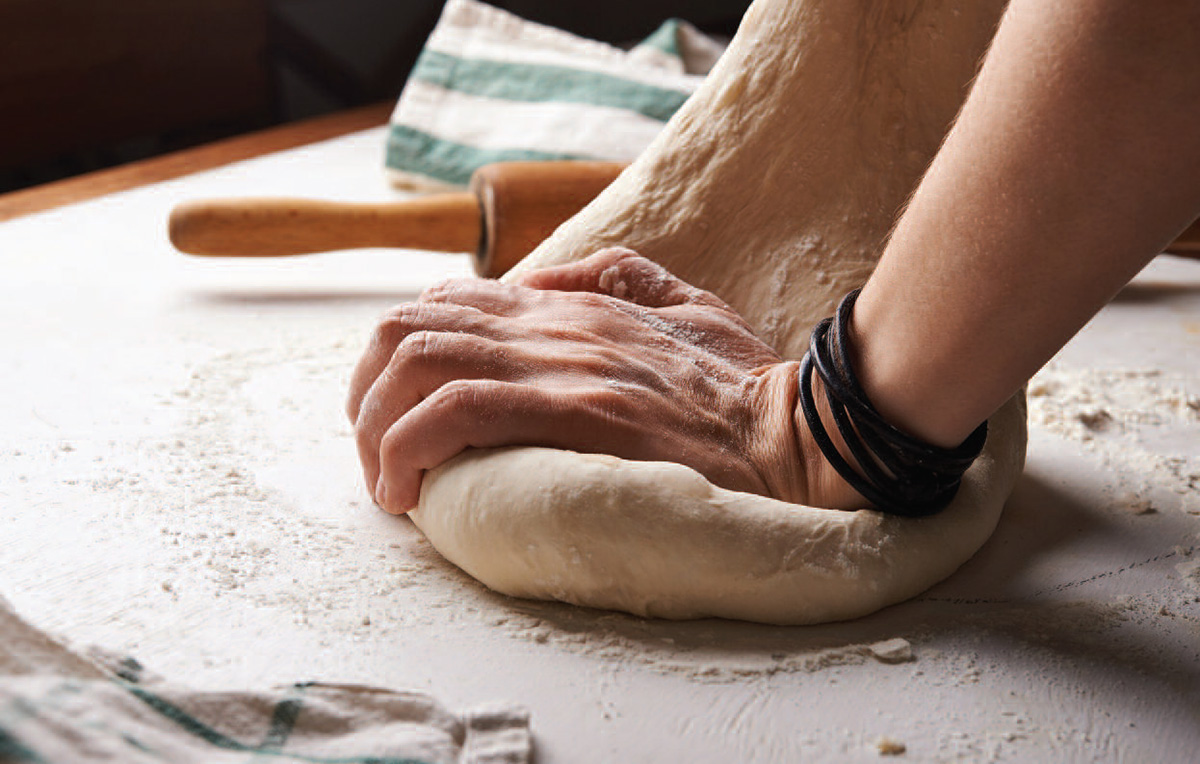
Baking and awakening, from a famed Zen cook
Many years ago, in the early ’80s, when Thich Nhat Hanh was giving a talk prior to departing from the San Francisco Zen Center where I was living, he said he had a goodbye present for us. We could, he said, open and use it anytime, and if we did not find it useful, we could simply set it aside. Then he proceeded to explain that, “As you inhale, let your heart fill with compassion, and as you exhale, pour the compassion over your head.”
Thich Nhat Hanh is generous with his teachings, as well as gracious and kind, and he reminded us that if we didn’t know what compassion felt like or how to let it fill our chests, we could allow some warmth or light, some ease or buoyancy to fill our hearts. Pouring it over our heads, he said, could be quite relaxing and invigorating. He also mentioned that in Vietnam in the heat of the jungle they would sometimes refresh themselves using a half coconut shell attached to a handle to scoop up cool water and—here he gestured—pour it over the head. Then you let the fresh and soothing quality of the water seep down or wash through you.
It was a gift I used daily, repeatedly, for two or three years. Rough edges softened. Tension melted. Energy flowed. I had been given, I was giving myself, a renewed body, which felt more and more like home, warm and hospitable. Would you like one too? Gifts like this take practice, the practice of giving your attention, your warm-heartedness to your activity.
This kind of giving, the giving of inner resources, can be done each moment under various circumstances, and we can cultivate or develop our capacity to do so while speaking with a friend, meeting a stranger, playing with our children, cooking food, washing laundry, soothing ourselves. Is there some way for it to be a gift all the way around?
The capacity to give is the capacity to receive. Often we don’t know how to receive, to notice and appreciate the gifts that are ours always. Hands, for one, are ready to be hands, to massage shoulders or to shovel the dark earth. They are gifts waiting to be given, waiting to be opened, yet here we are, sitting at computers or watching television, and when it comes to cooking, we say, “Let the machines do it. I don’t have time.” We’ve forgotten the gift of our hands, the capacity to touch, handle, feel, sense; to wash, cut, cook, stir. Why bother, we wonder. It may be that we don’t have time, yet we may also lack heart.
It’s not the body that’s weak, and it’s not the hands that are unwilling. Assessing whether cooking is worth the effort is what the mind does best, and making that calculation, the mind ignores what the heart is offering: to receive the gift and pass it on. Bread cannot live by words alone. Giving and receiving go hand in hand. Given water, salt, yeast, and flour; given hands and our faithful warmhearted attention; bread appears. We let go of the heady evaluations and instead give our attention to stirring, mixing, kneading, to observing and sensing. Dough comes into being, develops elasticity, responds to the gestures we offer.
Afterward the hands tingle with vibrancy, alive and well, tension melted. We’re remembering what the Shakers told one another, “Work is a gift to the person working.” The person working is the first recipient of the gift of giving. By giving ourselves to the work, we receive the blessing of being alive in the present moment of eternity. We find ourselves in connection. We find ourselves at home—in sacred space.
Later still, after rising, the dough is shaped into loaves and swells up larger, and we can feel our joy swelling up as well. Warm from the oven, the bread awakens a vivid excitement and anticipation. Wonderful—an aroma close to intoxicating! The taste of earth made palatable. We belong here on earth. Can you feel it? What a gift.
The gift unopened remains inert, loses its power to invigorate and nourish. We look around for entertainment. The gift unused does not get shared and passed on. We eat out of packages that promise, “I’m quick. I’m easy. You won’t have to relate to me at all. Put me in the microwave, and I’ll be there for you.” No wonder we grow overweight and lazy. It’s too much work to actually cook.
The awesome, often unrecognized, gifts come from what is Beyond, beyond our understanding and comprehension, beyond our capacity to produce. Without our thinking, the world appears. Food comes from the bounty of nature, the work of many people, the offering of other forms of life. We cannot fathom or manufacture the lusciousness of a tomato vine-ripened in the sunlight. What is Beyond has many names: God, Emptiness, Source, the Way. It’s where the Muses hang out. Even in sports we recognize what is Beyond. When a basketball player is “in the zone” and can’t miss, he is said to be “unconscious.”
Our eyes give us the purple of cabbage and eggplant, the red of bell peppers and strawberries, ample curves and cosmic spirals. The toastiness of summery dried grasses in roasted almonds and the mellow pungency of sautéed onions are gifts from the nose as well as nature. The mouth flows with moisture as it senses sweet, sour, salty, bitter, peppery, the flavors of earth, water, air, and sunlight. The gift is there to be acknowledged and received. Come to your senses! You could savor and delight.
Even the thoughts and ideas, the joys and sorrows, the inspirations and guesses, the play of the mind, are gifts, which could probably use a bit of cooking to make them tasteful and delicious: Sort through and remove all loose ends, compost the soft and rotten spots, salt, season, and simmer until ready.
The Benedictine monk Brother David Steindl-Rast told us in a lecture that “every moment of experience is a gift from God, but for it to be a gift from God, you have to receive it as a gift from God. Not to receive this moment of experience as a gift from God is what we mean by sin.” An astonishing statement, as most of us had never heard it expressed this way previously! When we sit down to eat, we give thanks for this food. At the same time, we could be giving thanks for the opportunity to cook—a gift to the chef! A gift from the chef! And the gift of conviviality, the chance to share all this blessedness with one another, to share food at table in good company. Ah! Thank you eyes, ears, nose, tongue, and taste. Thank you, heart, for receiving and passing on the life-force, and thank you, hands, for taking things in hand and offering your handiwork to others.
What is it we really want? What more could we ask for than the capacity, the heart’s capacity, to sense what is truly precious, to acknowledge and receive the gifts born of our care and attention, to nourish and be nourished? Hearts awaken.
What is it we really want? To be at home in this world, to be at home in this body and mind, receiving the gifts from Beyond and passing them on. The gift in working becomes the gift in eating. What more could we ask for than to activate our capacity, our heart’s capacity, to sense what is truly precious, to acknowledge and receive the gifts born of our care and attention, to nourish and be nourished? No longer holding ourselves back (while we check to see if we are doing it right), hearts awaken, and we feast.
Food tastes better when the cook is joyful. ♦
Excerpted from NO RECIPE: Cooking as Spiritual Practice, by Edward Espe Brown. Sounds True, May 2018. Reprinted with permission.
From Parabola Volume 43, No. 2, “The Miraculous,” Summer 2018. This issue is available to purchase here. If you have enjoyed this piece, consider subscribing.
